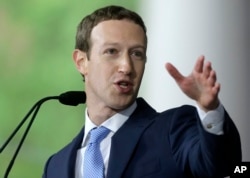They took to Twitter, Facebook and their corporate blog posts. They called their congressional representatives, signed letters and pledged to fight.
This week, many tech industry leaders geared up for battle after the Trump administration announced it was ending the Deferred Action for Childhood Arrivals (DACA) program, which allows people in the U.S. without legal documents to live, work and go to school without fear of deportation.
The fate of young adults who benefited from DACA is a civil rights issue, say tech executives and leaders.
However, the lengths to which the tech industry will go to get Congress to act before the program expires in six months remain unclear.
Already, some tech executives have pledged not to fire employees who are DACA beneficiaries, even if they lose the legal right to work in the U.S.
Tools of political action
But there is more the tech industry could do. It could use its very services to put out a call to employees and customers to lobby Congress, something many firms and organizations did in 2012 when they successfully fought anti-copyright piracy legislation.
Tech companies also could pledge not to disclose personal information collected on their platforms to authorities to help deport people.
While many tech leaders spoke out this week against the decision, it's not clear how uniform the industry is about how to advocate for DACA beneficiaries.
“They need to go to Washington and sit down with people and say, ‘Get this done,’” said Todd Schulte, president of FWD.us, an advocacy group co-founded by Facebook CEO Mark Zuckerberg. “It is a must-pass legislative item.”
DACA before tax reform
Some companies have promised to make congressional legislation their No. 1 issue, even putting aside their long-held hopes for tax reform, which congressional leaders pledged to address this fall.
Brad Smith, president and chief legal officer at Microsoft, said Congress should pursue DACA legislation before tax reform.
“We need to put the humanitarian needs of these 800,000 people on the legislative calendar before a tax bill,” Smith wrote in a blog post.
The software giant also is pledging to help with the legal costs of the 39 DACA beneficiaries who it knows work at its company, he said.
Zuckerberg, in a Facebook post, called on people to contact congressional representatives.
In an email to employees, Apple CEO Tim Cook said the company would provide help to the more than 250 employees who are in the program, according to CNET.
Ads attacking Trump
The Emerson Collective, the philanthropic organization run by Laurene Powell Jobs, Steve Jobs’ widow, began airing political ads Wednesday in some cable markets criticizing the Trump administration action regarding DACA.
Outside of Silicon Valley, business leaders also were joining the call for action.
Stas Gayshan, managing director of Cambridge Innovation Center, a workspace business in the Boston area catering to entrepreneurs, said he planned to be part of “ramping up pressure to make it clear that these folks are Americans.”
“This is a pretty clear assault on what makes our country great,” said Gayshan, who came to the U.S. as a refugee from Uzbekistan when he was nine years old.
In Chicago, Rishi Shah, chief executive officer and founder of Outcome Health, a digital health firm currently valued on paper at more than $1 billion, said he was seeing the tech industry move quickly to get Congress to act.
“This is not a niche issue for the industry,” said Shah, whose father emigrated to the U.S. from India. “We really see this as a defining moment.”






